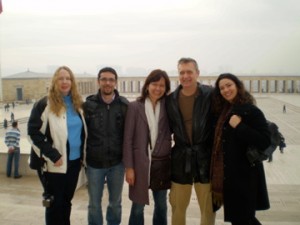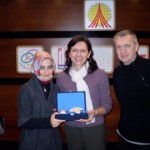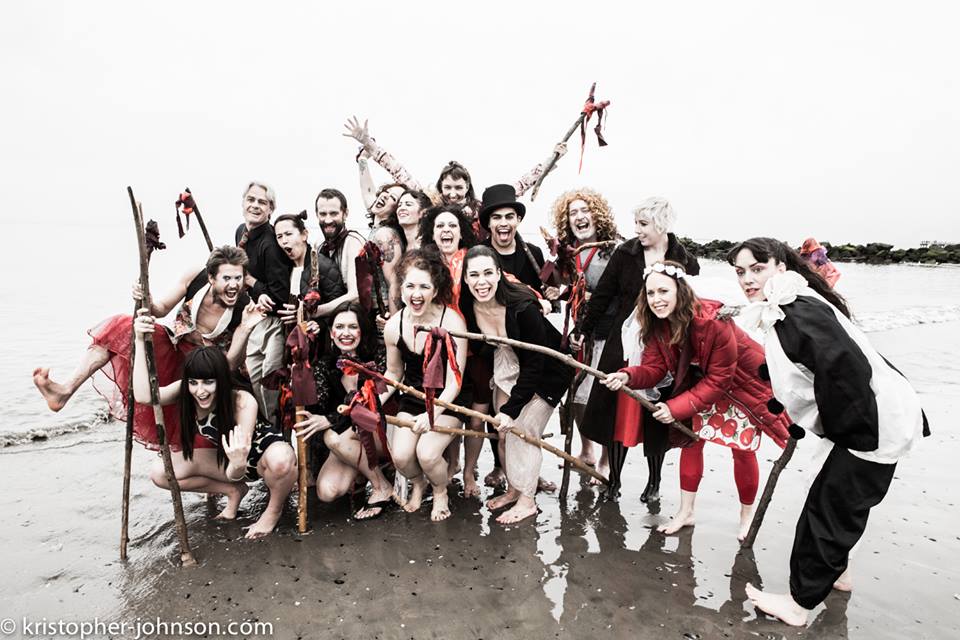We want your input. With this post we would like to take you on a part of the journey of this project, including a little history of Turkey and some articles relevant to the project… Read or just browse and follow the links that interest you. Tell us what your thoughts are in the comment section. We want to hear from you.
S/he came into being over the course of three years and we are excited to present its first iteration at Ithaca’s Kitchen Theatre Company and work with its unfailingly supportive staff at their brand new facility. For more information about S/he and related events, go to our “S/he” site.
The impetus to create S/he with our Turkish colleagues originated, you might be surprised, in Germany, a country with which we have a deep connection and where there are almost 3 million Turks living today. Headscarf-wearing, often non-German speaking women stand in stark relief to traditional Germans, and news stories of oppression and abuse caught our attention. We decided to focus on the role of the headscarf and see where this took us.
 So we began in the obvious way — with a trip to Turkey. Turkey straddles Asia and Europe, with Istanbul’s Bosphorus River marking the dividing line. It has a rich history that includes the Trojan War, the glory of Byzantium and the fall of Constantinople/birth of Istanbul. Modern Turkey was founded in 1923 by Mustafa Kemal, better known as Ataturk after the collapse of the 600-year-old Ottoman Empire and a 3-year war of independence. For a short, concise overview of Turkey’s recent past, a BBC overview might prove helpful.
So we began in the obvious way — with a trip to Turkey. Turkey straddles Asia and Europe, with Istanbul’s Bosphorus River marking the dividing line. It has a rich history that includes the Trojan War, the glory of Byzantium and the fall of Constantinople/birth of Istanbul. Modern Turkey was founded in 1923 by Mustafa Kemal, better known as Ataturk after the collapse of the 600-year-old Ottoman Empire and a 3-year war of independence. For a short, concise overview of Turkey’s recent past, a BBC overview might prove helpful.
Ataturk almost instantaneously turned Turkey’s gaze from East to West. He secularized Turkish society, reducing Islam’s dominant role and replacing Arabic with the Latin alphabet for writing the Turkish language. And he launched many reforms towards giving women equal rights and opportunities.
Over the past two years, Turkey has been in the news on a regular basis as this Near Eastern/European country negotiates its political identity and struggles to rectify tensions among the secular and Muslim populations within its borders. We wanted to learn how women fit into this debate — what the struggles are that Turkish women face, particularly young women, and how these relate to the issues women in the U.S. face. Is patriarchy in ascension or decline in our two countries?
During our several trips to Turkey, we met with NGOs, universities, foundations, news organizations, theaters and other institutions. Gabriele took notes of what she learned and shared them with our creative team.
 Before long, we understood from the Turkish women we spoke to that Turkey’s volatile headscarf controversy was simultaneously central to Turkey’s culture and politics and also irrelevant. Central, in that it is the subject of heated political debate and domestic policy, much like the abortion question in the U.S., and irrelevant because women generally wanted to talk about broader issues affecting their lives and felt the headscarf debate to be a distraction.
Before long, we understood from the Turkish women we spoke to that Turkey’s volatile headscarf controversy was simultaneously central to Turkey’s culture and politics and also irrelevant. Central, in that it is the subject of heated political debate and domestic policy, much like the abortion question in the U.S., and irrelevant because women generally wanted to talk about broader issues affecting their lives and felt the headscarf debate to be a distraction.
When we commissioned Zeynep and Tammy, we gave them few parameters. We wanted them to write about what was on their minds. We passed on articles that we found of interest but otherwise gave them no specific instructions. Here are some articles that might spark your interest:
New York Times columnist Bob Herbert’s column, “Women at Risk” in which he writes:
We [Americans] have become so accustomed to living in a society saturated with misogyny that the barbaric treatment of women and girls has come to be more or less expected.
The European Commission’s tracking of Turkey’s progress in reaching certain benchmarks to join the European Union:
Regarding women’s rights, Turkey’s main problem areas include violence against women, such as so-called honor killings; the illiteracy rate, which is about one-third among women.
Theresa Rebeck’s Laura Pels keynote address on women in the theatre community:
Generally, over the last 25 years the number of plays produced that were written by women seems to have vacillated between 12 and 17 percent… Which brings us finally to another couple of statistics which I think are worth noting: Women buy more tickets. They buy 55 percent of movie tickets and anywhere from sixty to SIXTY FIVE percent of theater tickets. So opening our stages and our hearts and our minds to women playwrights is not only cool and relevant and interesting and just—it is also a sound business model.
Hanna Rosin’s article “The End of Men” in Atlantic Monthly:
What would a society in which women are on top look like? We already have an inkling. This is the first time that the cohort of Americans ages 30 to 44 has more college-educated women than college-educated men, and the effects are upsetting the traditional Cleaver-family dynamics. In 1970, women contributed 2 to 6 percent of the family income. Now the typical working wife brings home 42.2 percent, and four in 10 mothers—many of them single mothers—are the primary breadwinners in their families.
Clay Shirky’s “Rant about Women”:
This worry isn’t about psychology; I’m not concerned that women don’t engage in enough building of self-confidence or self-esteem. I’m worried about something much simpler: not enough women have what it takes to behave like arrogant self-aggrandizing jerks.
Muhtar Kent, Turkish-American Chairman of the Board and CEO of The Coca-Cola Company, published an article in the Huffington Post, “This Century Goes to the Women”:
Let’s discuss the future of our global economy and society. Specifically, I’d like to discuss women, and the role women will play in transforming our global economy and society over the next decade. I also want to share some thoughts on the role women will play in helping transform The Coca-Cola Company over the next decade and beyond.
Nicholas Kristof and Sheryl WuDunn’s book “Half the Sky”:
lays out an agenda for the world’s women and three major abuses: sex trafficking and forced prostitution; gender-based violence including honor killings and mass rape; maternal mortality, which needlessly claims one woman a minute… The best way to fight poverty and extremism is to educate and empower women and girls.
 The remarkable plays that Zeynep and Tammy ultimately wrote are both entertaining and provocative, and serve as a springboard for discussion.
The remarkable plays that Zeynep and Tammy ultimately wrote are both entertaining and provocative, and serve as a springboard for discussion.
We now invite you to participate in our dialogue. What are the issues that matter most to you? What/who influences you in your thoughts and opinions on the issues surrounding gender? What are the stories from your own lives that have affected you most? What would you like to ask or share about this project? About Turkey? About the United States?
